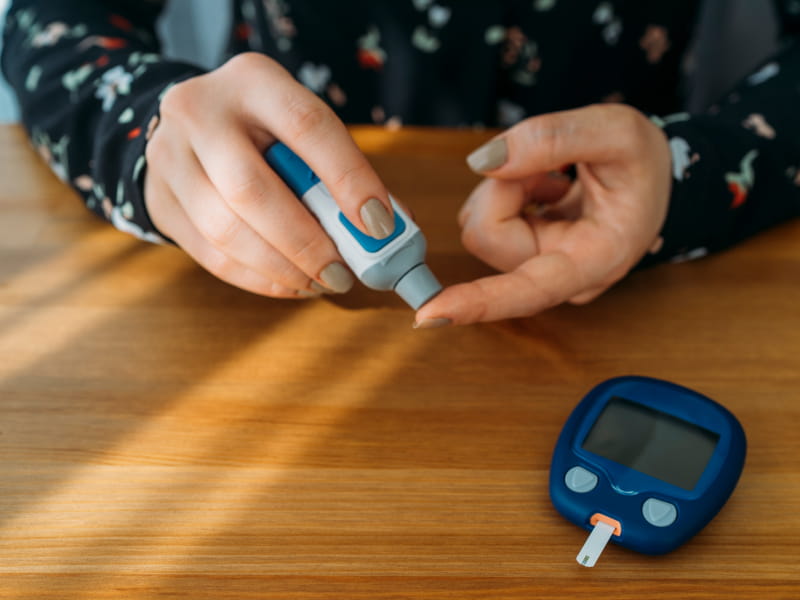Controlling diabetes takes on greater urgency during COVID-19 pandemic
By Laura Williamson, American Heart Association News

Uncontrolled blood sugar is dangerous at any time. But with mounting evidence showing that COVID-19 places people with diabetes at higher risk for severe illness, the need to keep diabetes well-managed has become more important than ever.
"Diabetes is itself a risk factor for a more severe case of COVID-19," said Dr. Prakash Deedwania, professor of medicine at the University of California, San Francisco.
After cardiovascular disease, diabetes is the second most common underlying health condition associated with severe outcomes in COVID-19 patients, making people with diabetes six times more likely to be hospitalized and 12 times more likely to die than those without pre-existing, underlying conditions, according to the Centers for Disease Control and Prevention.
But having diabetes under control can make all the difference. A recent study from China published in the journal Cell Metabolism showed people with COVID-19 but had better-controlled glucose had a lower death rate than those with poorly controlled glucose.
Yet, people with uncontrolled blood sugar seem to be staying away from emergency rooms since the pandemic began. The CDC reports emergency room visits for blood glucose problems have fallen 10% since March.
And that can set them up for a worse case of COVID-19 – "the very thing they are trying to avoid," Deedwania said.
"One should not fear going to whatever place of care they need to go to get blood glucose under control," he said. "All of those places are open and functioning and well aware of how to make the environment safe."
Blood glucose levels that remain high for too long can lead to long-term complications such as heart disease, stroke, kidney disease, nerve damage and amputations, as well as eye and vision problems, including blindness. Uncontrolled blood glucose levels also weaken the immune system, Deedwania said.
People with high blood sugar should stay in touch with their health care providers, said Dr. Joshua Joseph, assistant professor of medicine in the Division of Endocrinology, Diabetes and Metabolism at Ohio State University Wexner Medical Center in Columbus. "They need to manage their hyperglycemia."
Telemedicine use has increased during the pandemic. Joseph said his practice works with the patient to determine if the problem can be controlled at home through insulin adjustments or in an outpatient setting. But, if blood sugar is extremely high, patients are asked to come to the hospital, where precautions are taken to keep COVID-19 patients isolated and away from those being seen for other health care issues.
"Management is different all over the United States," he said. "Their care team can determine the best approach."
Deedwania and Joseph recommend people with diabetes take these steps to keep blood glucose levels under control:
– Take medications consistently as prescribed and keep enough on hand. "I want to emphasize there has been some misinformation about what drugs to use or not to use," Deedwania said, including drugs called ACE inhibitors and angiotensin receptor blockers often used by people with diabetes to prevent heart disease. The American College of Cardiology, American Heart Association and the Heart Failure Society of America issued a statement in March saying patients taking the drugs should continue treatment unless otherwise advised by their doctor.
– Check blood glucose levels frequently and make necessary adjustments to insulin and diet to keep levels under control. "Pay attention to what you are eating and don't eat a lot of takeout food," Deedwania said. "Eat what you can cook at home so you know what's in it."
– Manage stress levels. "As stress increases, it can make blood glucose go out of control," Deedwania said.
To manage blood sugar levels and keep stress at bay, Joseph said it's important to "maintain strong social support networks and healthy relationships. Get physical exercise – at least 150 minutes per week. Get enough sleep. Use mindfulness and meditation, deep breathing or listen to music."
"And of course, remember to take all necessary precautions to avoid exposure to COVID-19," Deedwania said. That includes staying at least six feet apart from other people in public, or from anyone outside immediate family who enters your home. And "always wear a mask (in public), especially if you have diabetes."
If you have questions or comments about this story, please email [email protected].





